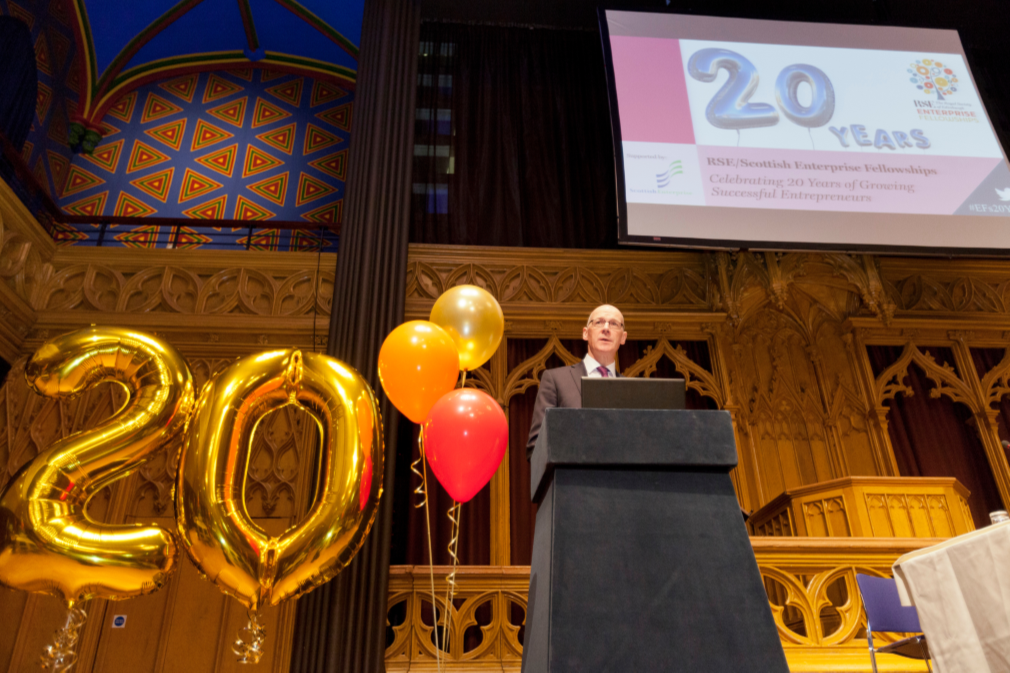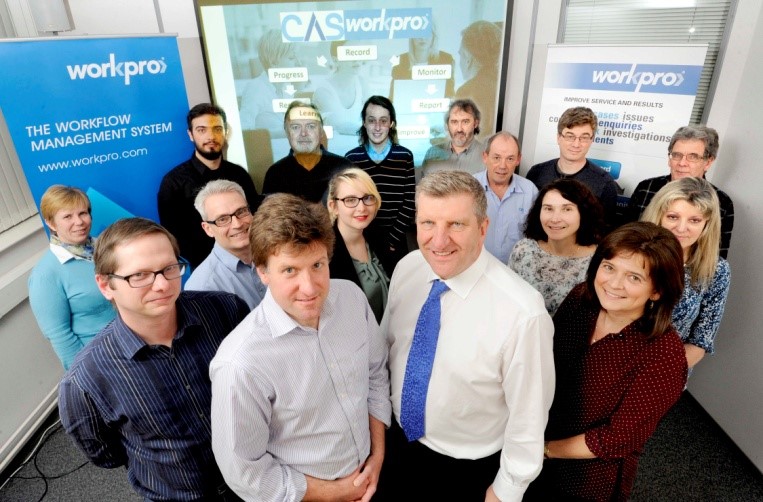 At an event held at The Hub in Edinburgh the Royal Society of Edinburgh (RSE) hosted a gathering to celebrate 20 years of Scottish Enterprise supported RSE Enterprise Fellowships.
At an event held at The Hub in Edinburgh the Royal Society of Edinburgh (RSE) hosted a gathering to celebrate 20 years of Scottish Enterprise supported RSE Enterprise Fellowships.
RSE Enterprise Fellowships are granted to individuals seeking to commercialise innovative ideas resulting from academic research in the arena of science and technology. The objective of the programme is to support innovators’ transition into successful entrepreneurs with viable commercial companies. The Fellowships enable individuals to advance the commercial potential of existing research or technology-based ideas whilst supporting them with a year’s salary, business training, business development funding and access to mentors, business experts and professional advisers.
Encouragingly the female to male ratio of applicants to the scheme is strong, with 41% of Enterprise Fellows in the last 5 years being female. Hailing from diverse disciplines, the companies created also cover a broad spectrum of sectors; from real-time 3D audio technology to English language education apps; wearable golf performance tracking technology to sustainable skis for the free-ride market.
Enterprise Fellowships are administered by the RSE and are funded by Scottish Enterprise and the UK Research Councils: BBSRC, STFC and NERC. The Fellowships were created following the Commercialisation Inquiry of 1996, which included the Scottish Government, Scottish Enterprise and the RSE.
Since 1997, Scottish Enterprise has supported 158 Enterprise Fellows, representing an investment of over £13.4M with a cost per fellow on average of £85,000. STFC joined the scheme in 2002 and BBSRC in 2005. NERC joined the programme in 2016 with a pilot scheme to support 5 Enterprise Fellows working within NERC’s remit of terrestrial, marine, freshwater, science-based archaeology, atmospheric and polar sciences, and Earth observation.
Yesterday’s event championed the successes of those awarded with these prestigious Fellowships. It also highlighted the vitality of Scotland’s research sector and the huge contribution that the commercialisation of academic research makes to Scotland’s economy. In a recent survey, former Enterprise Fellows reported having attracted over £90M follow-on investment in the form of public funds and private investments in the last year.
Deputy First Minister John Swinney, who delivered the keynote speech at the event, said: “We are committed to supporting research and innovation and have made clear our aspiration for Scotland to be at the forefront of the digital, high tech and low carbon innovations that will shape the future.
“The Enterprise Fellowship programme is a great example of the importance of nurturing and developing innovation and the valuable role of universities in supporting entrepreneurial culture. We will continue to work closely with universities to achieve our goal of becoming a world-leading entrepreneurial and innovative nation within framework of Scotland CAN DO.”
Commenting on the event yesterday President of the RSE, Professor Dame Jocelyn Bell Burnell said, “It gave me great pleasure to host such a celebratory event that allowed us to reflect on 20 years of enabling successful entrepreneurs in Scotland. The event provided an opportunity to commend and acknowledge the commercial successes coming out of academia here in Scotland. We are very proud of the successes of the RSE Enterprise Fellowship programme and of those Enterprise Fellows who go on to create the exciting companies that are so successful today.”
Back when the programme began in 1997 there were just 4 Scottish Enterprise supported Fellowships awarded. Now the scheme has grown to allow for 2 cohorts of Enterprise Fellows per year which enables aspiring entrepreneurs to access the programme at the right time so that they can capitalise on being ‘first to market’ if appropriate. Year on year growth in applications continues with 2016 and 2017 seeing the biggest number of Enterprise Fellows going through the scheme. On average, there are now around 16 Fellows going through the programme across all funders and all science and technology sectors per year.
Spanning the 20 years of the programme, Scottish Enterprise supported Enterprise Fellows have been hosted by 17 Universities and Research Institutes across Scotland. Eleanor Mitchell, Director of Entrepreneurial Growth, Grant Appraisal and Management at Scottish Enterprise commented, “Scottish Enterprise is delighted to have worked with the RSE over the past 20 years in developing and delivering the Enterprise Fellowship programme. This has enabled the creation of at least 96 new technology and engineering based companies and reflects Scottish Enterprise’s ongoing commitment to supporting entrepreneurs to optimally exploit the wealth of opportunities that arise from Scotland’s inherent strengths in technology and engineering.”
There has never been a better time to start-up or spin-out a company in Scotland. With such a strong record of success, the RSE’s Enterprise Fellowship Scheme grows in popularity, allowing aspiring entrepreneurs to take those important first steps toward building a thriving business, while supporting the growth of Scotland’s economy and the nation’s great tradition for nurturing innovation. The RSE looks forward to seeing the strength of the competition for these prestigious Fellowships grow and grow.
 Scottish Enterprise is hosting succession planning masterclass in Edinburgh with local businesses Computer Application Services and Mike Stoane Lighting
Scottish Enterprise is hosting succession planning masterclass in Edinburgh with local businesses Computer Application Services and Mike Stoane Lighting
Scottish Enterprise is hosting a free event in Edinburgh on Wednesday 8 November designed to encourage business owners to consider their succession options.
Delivered by Co-operative Development Scotland (CDS), the arm of Scottish Enterprise that supports company growth through collaborative and employee ownership business models, the event will host presentations from the owners of Edinburgh-based employee-owned businesses Mike Stoane Lighting and Computer Application Services (CAS).
Taking place at Anderson Strathern’s office in Edinburgh, the event is part of a series of masterclasses from CDS on the topic. The sessions are intended to cover the importance of succession planning with a review of the range of options available, including employee ownership.
IT company CAS took the route to employee ownership when a trade sale didn’t materialise. The chief executive and chairman invested a proportion of shares with the remainder going to an employee trust or bought by individual employees. The company has since sought external funding to enable growth plans and is thriving.
Mike Stoane wanted to exit his company in a way that meant minimal disruption to the great team he had built up. He sold the majority of his shareholding in his lighting design and manufacturing firm, Mike Stoane Lighting, to an employee trust. Majority trust ownership allows firms to pay bonuses exempt from income tax subject to certain conditions being met.
Bruce Farquhar, chair of Anderson Strathern and speaking at the event to talk through the succession options open to business owners, said: “Business succession is often the elephant in the board room, however poor planning can leave a previously successful business very vulnerable.
“The traditional exit route of selling to a trade buyer isn’t universally attractive, especially to SME and family businesses. A sale to a competitor can deliver a nice price to a seller, however for many owners of small businesses, the company value is more than its cash worth. Many of these companies have a unique culture, strong supplier and customer relationships and a loyal, long service workforce.
“There is another succession option coming to the fore in the Scottish business-place; a sale to the employees means that the people who know the company best are in control, relationships are maintained, and the business stays in the area.”
CDS’ research estimates approximately 16,000 employers in Scotland will be looking to transfer ownership in the next five years.
CDS director Sarah Deas said: “Our overall aim is to support owners in developing their succession strategies. These events are a fantastic way for business owners who are considering an exit from their company to learn more about their options through expert advice and the first-hand experiences of others.”





